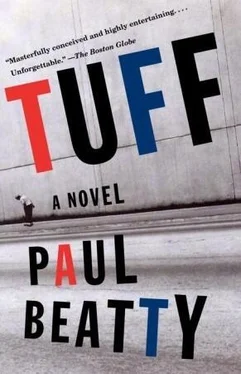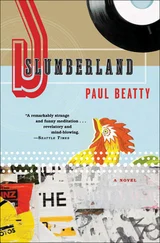Now on this, the last cool night of summer, Brooklyn was short three more niggers for Winston to hate. Although he addressed all black men as “God,” Chilly Most, apparently less than divine, was unable to resurrect himself. Zoltan Yarborough, who was always running off at the mouth about his proud Brooklyn roots, “Brownsville, never ran, never will,” had become the rigid embodiment of his slogan. He had one leg over the windowsill, and a bullet hole in him that, like everything his mother ever told him, went in one ear and out the other. Demetrius Broadnax from “Do-or-die Bed-Stuy” was shirtless on the floor with a column of bullet holes from sternum to belly button in his muddy brown torso. Winston gloated over Demetrius’s body, looking into his ex-boss’s glassy eyes, tempted to say “I quit” and ask for his severance pay. Instead he walked to the aquarium, pressed his nose against the glass, and wondered who was going to feed the goldfish.
Like most of the jobs Winston had taken since graduating high school, this one also ended prematurely, after a job interview only two weeks ago where the look on his face was his résumé and two sentences from his best friend, Fariq Cole, were his references. “This fat nigger ain’t no joke. Yo — known uptown for straight KO’ing niggers.” There was no “So, Mr. Foshay, how do your personal career goals mesh with our corporate mission? Would you consider yourself to be a self-starter? What was the last book you read?” Demetrius simply handed Winston the inner-city union card, a small black.22 Raven automatic pistol, which Winston coolly, but immediately, handed back.
“What, your ass don’t need a burner?”
“Naw.”
“Look, fool, maybe you can body-slam niggers out on the street, but in this business, people don’t walk in the door shaking their fists in your face.”
Winston shrugged.
Demetrius studied him up and down and asked, “You ain’t shook, are you? You don’t seem the scary type.”
“Never back down. Once a nigger back down, he stay down, know what I’m saying? Just don’t like guns.”
“Well, when some niggers do come in blasting, your big ass be in the way and shit, two, three motherfuckers can hide behind you. Be here tomorrow afternoon at four.”
When Winston started work, he was “in the way and shit,” but not in the manner Demetrius had hoped. Winston’s job description was simple: four to ten, five days a week, answer the door, look mean and yell, “Pay this motherfucker, now!” at the balky customers. But the trip into Brooklyn made him edgy. His childhood traumas kicked in, undoing his cool. Instead of suavely sauntering around counting his money every five minutes, Winston fumbled about the drug den, stepping on people’s toes, toppling everything he touched, and talking nonstop. He tried to lighten the somber felonious atmosphere by telling embarrassingly bad jokes. (“You hear the one about why Scots wear kilts?”) After the flat punchlines (“Because sheep can hear a zipper open from one hundred feet away”) there would be a barely audible metallic click, the sound of Demetrius switching the gun’s safety to the off position.
Winston had trouble keeping track of the Brooklyn drug mores. Which colored caps went with what size plastic vials? Were portable televisions an acceptable form of payment? He was unable to distinguish one crew’s secret whistle from another’s. How often had Demetrius yelled at him, “You moron, don’t flush the drugs! That’s the mating call of the ruby-crowned kinglet!” Then Chilly Most and the others would join in with their snide castigations: “As opposed to our secret signal—”
“The flight song of the skylark.”
“A gentle woo-dukkadukka-woo .”
“Good ol’ Alauda arvenis , indigenous to Eurasia, but common in the Northwest Territories of Canada, if I’m not mistaken.”
“You are not, you nigger ornithologist, you.”
The last time Winston heard the cherished secret whistle, he answered the door and two niggers he’d never seen before, brandishing firearms, rushed past him and, before they could be properly announced, introduced themselves with a bullet in Chilly Most’s newly shorn bald head. Winston did what his coworkers always said he’d do if he ever found himself face-to-face with a gun: he fainted “like a bitch.”
Three minutes had passed since Winston regained consciousness, and he couldn’t leave the apartment. It was as if he were spacewalking, tethered to some mother ship treading Brooklyn ether. He would clamber for the door and a muffled sound in the hallway or a distant siren would drive him back into the living room. He began to mumble: “This like that flick, the bugged-out Spanish one where the rich people couldn’t leave the house. Luis Bustelo or some shit. What is it … surrealism? Well, I got the surrealisms.”
A creak in the floor behind him stopped Winston’s babbling. He quickly about-faced, balling his shaky hands into fists.
“Who dat?”
“Who dat?” came the response. Winston relaxed. He smiled, “Nigger,” unclenched his fists, and plopped down on the sofa.
Fariq Cole hobbled into the living room, his crutches splayed out to the side, propelling him forward. Fariq’s friends called him Smush because his nose, lips, and forehead shared the same Euclidean plane, giving him a profile that had all the contours of a cardboard box. Each herky-jerky step undulated Fariq’s body toward Winston like a Slinky, alternately coiling and uncoiling. A solid-gold dollar-sign pendant and a diamond-inlaid ankh whipped about his neck in an elliptical orbit like a jewel-encrusted satellite. Fariq stopped next to the doorjamb, tilted his head to the side, and cut his friend a dubious look.
“Who was you talking to?”
“Nobody. Just trying to figure out why I was still here.”
“You still here because you couldn’t leave without me, your so-called boy.”
“You is. But it wasn’t you — I barely got to work ten minutes ago, I didn’t even know you was here. Naw, it’s something else.”
Fariq was the coolest of the many cool handicapped East Harlemites. His appearance was inner-city dapper, functional and physically fit assimilationist. Despite the soft spot in his head where his skull had never fused, it’d been a long time since he’d worn a cyclist’s helmet. The bill of his fiberglass-reinforced Yankee baseball cap hung over his left eye, shadowing the surgical scars. The baggy corduroys covered up his leg braces. His clubfeet were squeezed into a pair of expensive sneakers, though he’d never run a step in his life. Fariq ran his tongue over his precious-metal-filled mouth, the front four incisors, top and bottom, capped in a gold-and-silver checkerboard pattern. Etched on his two front teeth were small black king and queen chess pieces, christened “Fariq” and “Nadine” in microscopic handwriting.
“Now look at these no-money motherfuckers — who going to take care of their families?” Fariq said, a rubber-tipped crutch sweeping across the carnage. “That’s why a prudent motherfucker like me has an IRA account, some short-term T-bills, a grip invested in long-term corporate bonds and high-risk foreign stock. Shit, the twenty-first-century nigger gots to have a diversified portfolio — never know when you gon’ have a rainy day. And look like it was thunderin’ and lightnin’ in this motherfucker.”
Winston and Fariq had known each other since the subway cost seventy-five cents. Fariq was an enterprising shyster who dragged Winston, the muscle, along on all his moneymaking schemes, the first of which was a fifth-grade dognapping operation so immense it required the use of every rooftop pigeon coop on 109th Street between Park and Second Avenues for kennel space.
Читать дальше












